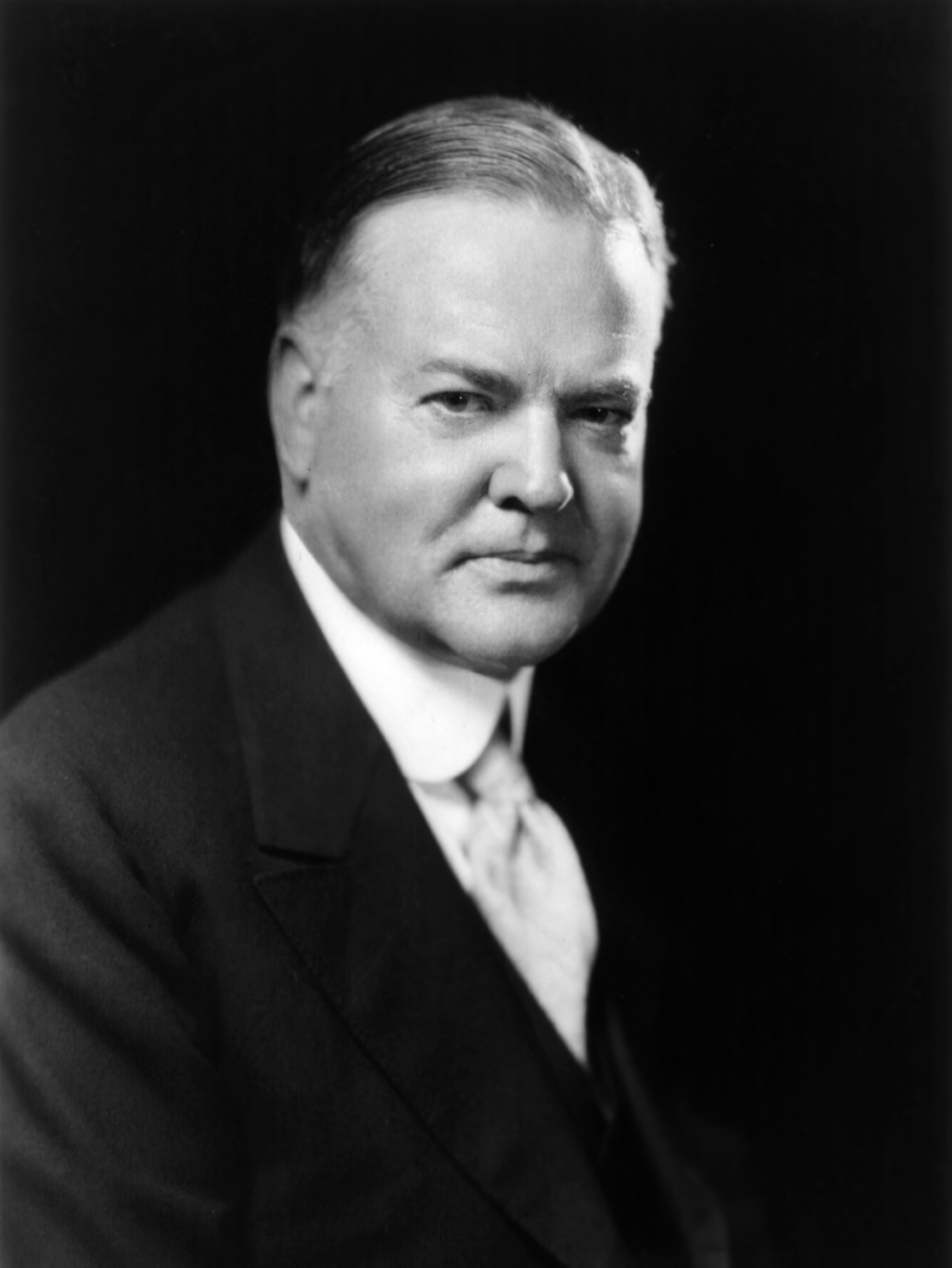
Presidency of Herbert Hoover
Herbert Hoover's tenure as the 31st president of the United States began on his inauguration on March 4, 1929, and ended on March 4, 1933. Hoover, a Republican, took office after a landslide victory in the 1928 presidential election over Democrat Al Smith of New York. His presidency ended following his defeat in the 1932 presidential election by Democrat Franklin D. Roosevelt.
For a chronological guide, see Timeline of the Herbert Hoover presidency.Cabinet
Hoover was the third straight Republican president, and he retained many of the previous administration's policies and personnel, including Secretary of the Treasury Andrew Mellon. Hoover favored policies in which government, business, and labor worked together to achieve economic prosperity, but he generally opposed a direct role for the federal government in the economy. Seeking to address an ongoing farm crisis, Hoover signed the Agricultural Marketing Act of 1929. Despite growing public resistance to Prohibition, Hoover increased federal enforcement of Prohibition. In foreign affairs, Hoover favored non-interventionism in Latin America and pursued disarmament policies with the London Naval Treaty.
When the Wall Street Crash of 1929 struck less than eight months after he took office, Hoover tried to combat the ensuing Great Depression by reassuring public confidence and working with business leaders and local government. He also approved the Smoot–Hawley Tariff of 1930, which raised tariff rates and reduced international trade. As the depression worsened in 1931 and 1932, Hoover reluctantly gave in to calls for direct federal intervention, establishing the Reconstruction Finance Corporation and signing a major public works bill. At the same time, he signed the Revenue Act of 1932, which sought to maintain a balanced budget by raising taxes. However, the economy did not recover, and as a result, Hoover suffered an overwhelming defeat in the 1932 election. Hoover is usually ranked lower than average among U.S. presidents.
Historical reputation[edit]
Hoover was extremely unpopular when he left office in 1933 and remained unpopular for the next several decades.[139] In the 1930s, numerous popular diatribes appeared that were extremely harsh on Hoover; syndicated columnist Arthur Krock in 1931 said Hoover was a failure across the board as a party leader, economist, business authority, and personality.[140] Historian Allan Nevins in July 1932 wrote that Hoover was an "exponent of narrow nationalism." He "botched the tariff, he botched farm relief, he botched prohibition—because he showed a Bourbon temper and an inelastic mind."[141][142] Textbooks written in the older Progressive tradition identified Hoover with the reactionary side of class conflict. Arthur M. Schlesinger, Jr., a leading progressive exponent, strongly criticized Hoover in his influential work, The Crisis of the Old Order (1957). By the 1950s, however, a new school of consensus historians was replacing the Progressive approach, focusing on values shared across the political spectrum rather than class conflict. They started to praise Hoover for reforms that were picked up and further developed by Franklin Roosevelt's New Deal – such as relief of the unemployed, the Good Neighbor Policy in Latin America, and the Reconstruction Finance Corporation.[143]
Hoover's reputation experienced a strong recovery after 1970.[139] Revisionist scholars in the 1970s portrayed Hoover in terms of the activist Secretary of Commerce that was so attractive to voters in the 1920s, while recognizing some failings in the Depression years. Carl Degler showed that Hoover and FDR were similar in many ways—both were Wilsonians who were shaped by their First World War experiences, gave government a major role in the economy, and imposed controls on big business. To these historians, Hoover was the link between the 1920s and the New Deal.[143][144] These revisionist historians depicted Hoover as an individual "deserving of respect and historical study for his roles as a humane reformer, idealistic visionary, and institutional developer."[145] Hawley in 2019 concluded that most revisionist historians "continued to agree that Hoover had not been the hardhearted reactionary, financial charlatan, and do-nothing president depicted in the earlier derogatory portrait."[146]
Hoover has been the subject of numerous serious biographies in recent years. Only a few of them, such as William Leuchtenburg's Herbert Hoover (2009), reflect the old negative viewpoint of an unattractive character who was cold and overbearing with little to show for his reforms.[147] By contrast, Glen Jeansonne's Herbert Hoover: A Life (2016) emphasizes Hoover's remarkable combination of advanced technical knowledge, innovative organizing ability, highly profitable business acumen, and compassion for the civilian victims of the Great War. Jeansonne gives Hoover an "A" for effort in dealing with the Great Depression with all the tools known to the White House and new ones as well, albeit without great success.[148] Hoover's reputation has also been affected by works focusing on his career outside of the presidency; biographers such as George H. Nash have shed light on Hoover's career before 1921, while Gary Best wrote a work focused on Hoover's post-presidential career and his influence on the conservative movement.[149]
According to Professor David E. Hamilton, historians have credited Hoover for his genuine belief in voluntarism and cooperation, as well as the innovation of some of his programs. However, Hamilton also notes that Hoover was politically inept and failed to recognize the severity of the Great Depression.[139] Polls of historians and political scientists have generally ranked Hoover in the bottom third of presidents. A 2018 poll of the American Political Science Association’s Presidents and Executive Politics section ranked Hoover as the 36th best president.[150] A 2021 C-SPAN poll of historians also ranked Hoover as the 36th most effective president.[151]